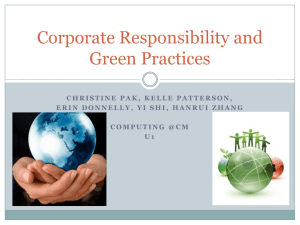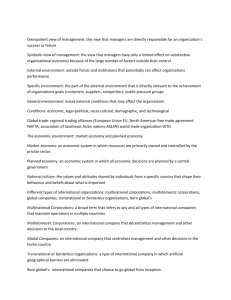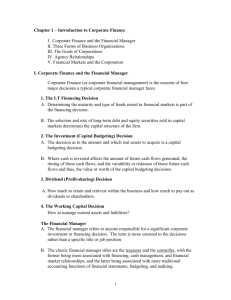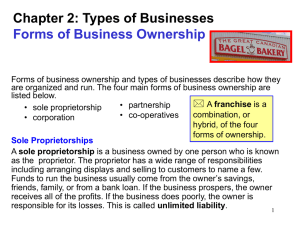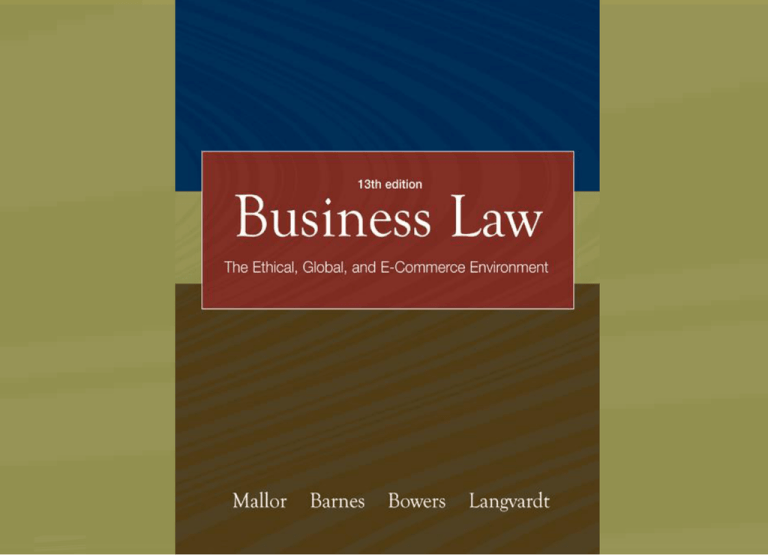
P A R T
10
Corporations
History & Nature of Corporations
Organizational and Financial
Structure of Corporations
Management of Corporations
McGraw-Hill/Irwin Business Law, 13/e
© 2007 The McGraw-Hill Companies, Inc. All rights reserved.
P A R T
10
Corporations
Shareholders’ Rights & Liabilities
Securities Regulation
Legal & Professional Responsibilities
of Auditors, Consultants, and
Securities Professionals
McGraw-Hill/Irwin Business Law, 13/e
© 2007 The McGraw-Hill Companies, Inc. All rights reserved.
C H A P T E R
41
History and Nature of
Corporations
“In every era, society must strike the right balance
between the freedom businesses need to compete
for a market share and to make profits and the
preservation of family and community values.”
Hillary Clinton, It Takes a Village (1996)
Learning Objectives
History of corporations
Classifications of corporations
Regulation of for-profit corporations
Regulation of nonprofit corporations
Regulation of foreign and alien corporations
Piercing the corporate veil
41 - 5
The Corporation As a Person
In 1886, the private corporation gained legal
status as a "natural person" under the U.S.
Constitution with the associated protections
Corporations today have legal status as a
person, specific authority for operation and
management, limited liability for owners,
easy transferability of an owner’s interest,
and the obligation to pay taxes
41 - 6
See Fig. 1, page 969
Classes of U.S. Corporations
By purpose:
For-profit corporations
Not-for-profit corporations
By ownership:
Publicly held (shareholders)
Close (a few shareholders)
41 - 7
Subchapter S
Government-owned corporations
Classes of U.S. Corporations
By origin – a company is:
41 - 8
Domestic in the state in
which the company
incorporates
Foreign in all other states
in which a company
operates
Alien in all countries
other than the country in
which it incorporated
Federal Regulation of Firms
Federal government has power to regulate
interstate commerce under the Commerce
Clause of the U.S. Constitution
Due Process Clause of Fourteenth Amendment
interpreted to allow a state to exercise
jurisdiction over foreign corporation if firm
has sufficient minimum contacts with a state
41 - 9
“Doing business” will allow jurisdiction, but
minimum contacts may be lesser activity
Doing Business Within a State
Not doing business:
Soliciting orders, sales through independent
contractors, owning property for investment,
conducting isolated transaction, maintaining
bank account for collection purposes
Doing business:
41 - 10
Maintaining an office, contracts with local
businesses, using real property, maintaining
inventory for order fulfillment, performing
service activities
Piercing the Corporate Veil
Corporation law provides an imaginary wall
– the corporate veil – between a corporation
and its shareholders to protect owners from
personal liability for corporation’s actions
A court may pierce the corporate veil to reach
individual shareholders if the shareholders
dominate the corporation (alter ego) or the
corporation is used for an improper purpose
41 - 11
See Fig. 2, page 979
Test Your Knowledge
True=A, False = B
41 - 12
A corporation is a fictitious, but legal, person.
Corporations may be classified only in terms
of ownership.
Under the Commerce Clause, states have the
power to regulate interstate commerce.
Texas Shipping, Inc. owns buildings and has
employees in Houston, TX and New Orleans,
LA, but “does business” only in Texas.
Test Your Knowledge
True=A, False = B
A state organized under Kansas corporate law
is a domestic company when it operates within
the state of Kansas and a foreign company in
any state other than Kansas.
Cole Inc. is owned by two people. Each owner
built a home with money obtained by a loan
from State Bank to Cole Inc. The corporate
shield provides absolute protection to both
owners from personal liability for repayment of
the loans.
41 - 13
Test Your Knowledge
Multiple Choice
A state law that regulates business activities
of a foreign corporation is constitutional if :
(a) It serves a legitimate state interest
(b) The legitimate state interest outweighs the
burden on interstate commerce
(c) It is the most burdensome means of
promoting that interest
(d) All of the above
(e) A and B, but not C
41 - 14
Test Your Knowledge
Multiple Choice
Which of the following activities meet the
requirements for doing business in a state?
(a) Owning personal property as investment
(b) Maintaining a bank account for collection
purposes
(c) Maintaining a storefront for product sales
(d) Soliciting product orders through a catalog
(e) All of the above
41 - 15
Thought Questions
Does an online stock transaction meet the
sufficient minimum contacts criteria of the
International Shoe ruling? In other words, if
a consumer is injured by an online stock
trade, could the consumer sue the company
in her or her state court system?
41 - 16



